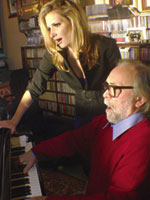 Hamish and a lesson with Alexandria Beck (© Ray McKie)
Hamish and a lesson with Alexandria Beck (© Ray McKie)Hamish Pitceathly returned to England from South Africa in 1949, his intention being to study the piano. His teachers - Ronald Styles (a pupil of the great Frederick Lamond and Louis Kentner) and (briefly) Leff Pouishnoff - passed on an important sense of tradition stretching back to Beethoven, and a lasting fascination for the music of Liszt. Unfortunately, Classics and History, the latter at Oxford, were decreed as essential preliminaries to further musical studies - a bargain that was never fulfilled.
At Oxford, he took part in several operatic productions, but bad training took a savage toll. In 1959, he began to re-train his voice with Maestro E. Herbert Caesari, perhaps the only inheritor of a tradition of singing and comprehension of technique that was established in the early nineteenth century and through such great singer-teachers as Antonio Cotogni and Riccardo Daviesi passed on to Caesari, Gigli (always very closely associated with Caesari) Lauri-Volpi, Pertile, Schipa, Tetrazzini, Mary Garden, Sheridan, Dinh Gilly, and Inghilleri. He worked intensively for ten years with Caesari, often travelling to London from Brighton after a full day's teaching four times a week, and in 1968 he even turned down the invitation from a Canadian University to take charge of all its vocal studies, choral music and operatic production: and Caesari, then in his late eighties, encouraged him to consider himself as a successor to his practice.
After Caesari's death in 1969, he withdrew into University teaching, but in 1976, Alma Caesari, herself a noted teacher, persuaded him to increase his involvement in vocal training and so help in the proper promotion of her father's work.